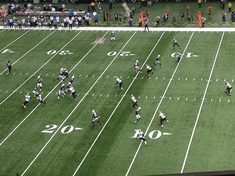
The Official Unofficial Study of Momentum in Sports
Last updated: Sunday April 25th, 2021
Report this blog
Before I begin, I'd like to preface this by saying, I am in no way a sports scientist or analyst. I am a JetPunker and sports fan who likes to get theoretical. What better way to do that than by creating an article on momentum?
Where Do We Start - What Exactly is Momentum?
Seeing as you clicked on this blog, I would assume that you a sports fan of some sort. The NCAA March Madness tournament just finished recently, with Baylor completing a wire-to-wire victory over Gonzaga. The Bears jumped out to a quick 9-0 lead and never looked back. Not to discredit Baylor, but Kenpom (a site that tracks offensive/defensive efficiency, luck, each team's strength of schedule, etc.) had the Zags as a decent favorite. So what caused this enormous blowout victory?
According to Jim Nantz (paraphrasing), "Baylor had all the momentum." But what does that mean?

Oxford's Dictionary of Sports Science defines momentum as "the positive or negative change in cognition, affect, physiology, and behavior caused by an event or series of events that affects either the perceptions of the competitors or, perhaps, the quality of performance and the outcome of the competition." In simpler terms, it's the idea that a big play (or big plays) will make the successful team play and feel better, while the other side will play and feel worse. It seems hard to understand something so intangible, but many athletes/sports commentators can "feel the momentum shifting." I can attest to this. I've given away and surmounted many leads in my pick-up soccer matches (and yes, our matches are to the same standard as professionals). In all seriousness, in a landscape with mastermind coaches, hyperbolic chambers, and days of game planning, can momentum really diminish those things in seconds? My answer is no. And in this official unofficial study, I will be making the case that momentum doesn't exist (or at least isn't quantifiable, but that's not good enough clickbait).
Making the Case - What are We Really Watching?
- Big plays (In our context we'll say passing plays > 25 yards and rushing plays > 10 yards) are deemed to be the proximal cause of momentum - Isn't it just the atmosphere and excitement of the crowd?
- Advanced analytics (at least in football) would show some correlation between a big play and offensive/defensive effciency
- The way momentum is defined doesn't really make sense
1. Big plays cause momentum
This idea makes sense. When a quarterback drops a dime in-stride to their receiver for a 50-yard bomb, should feel good. However, when everyone gets back to the line-of-scrimmage, that play is gone. Coaches and athletes say this all the time, "One play at a time." Let's think about an example. For context, Team A is driving down the field to score a touchdown, and they are on their own 40-yard line. They throw a 35-yard pass and are now on the opponent's 25. Let's say that they then average about 4 YPP (Yards Per Play) and take about six plays to get into the end zone. Touchdown. That's a good drive, but it seems a bit of a stretch to say that this first play was the catalyst for the score, especially when you consider how isolated each play is. What seems more sensible is that the crowd became excited and rowdy therefore getting the players excited. Crowd noise affects all players, whether they are on the field or not; realistically, a big play only affects those who were on the field at the time. Crowd noise is continual, and it is reasonable that teams feed off of this energy and excitement.
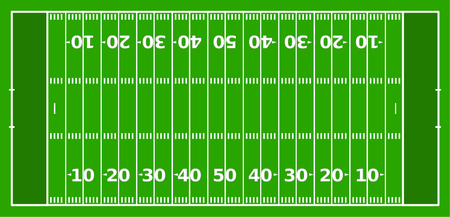
2. Advanced analytics
The main argument of momentum is that the successful team will see improved performance due to feeling better. Thanks to advanced analytics, we can test this theory. Stathead has a great tool called the NFL Drive Finder, which allows us to look at a team's performance after certain events. (Events include interceptions, punts, field goals, during overtime, etc.). In my case, I want to see how teams perform after their defense makes a huge play (interception, fumble, turnover on downs, muffed/blocked punt, muffed kickoff, blocked field goal) during the regular season (no OT included). I made the scoring margin from 0 to 14 to account for blowouts and made sure there were at least 5 minutes on the clock to account for lack of time. Here are the results:
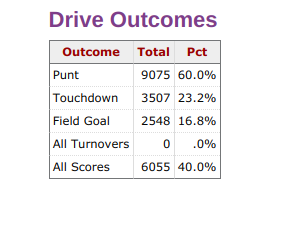
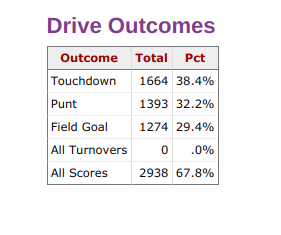
Looking at percentages, we can see that touchdown and field goal percentages increase after a big play. Using PPD (Points per Drive), drives started by punts totaled about 2.12 (32193 points on 15130 drives); drives started by big plays totaled about 3.57 (15470 points on 4331 drives). This difference looks quite sizable, but we need to apply context. The best team in terms of PPD in 2020 was the Green Bay Packers, at 3.22, totaling only a 0.35 difference from the big play PPD. The Jets (of course) had the worst PPD in the league, a measly 1.36. Taking the difference between the Packers and the Jets gives us 1.86; the difference between punt PPD and big-play PPD totals to 1.45 (for context, that's the difference between the Packers and the Bengals, who sit in 26th place). Why is it higher? Most likely because we have a smaller sample size, but considering how much momentum is mentioned by coaches and athletes, I would think the difference would be larger.
Another event that should cause momentum would be the defense getting a huge 4th down stop or turnover near their own endzone (Let's say the offense gets the ball on their own 10). For this study, I added two new criteria. First, each drive started within their own 10, then I also included turnovers on downs in my analysis, as it is more likely for teams to go-for-it in the red zone. These are the results:
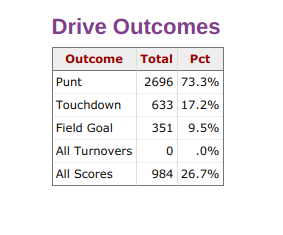
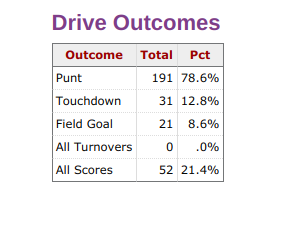
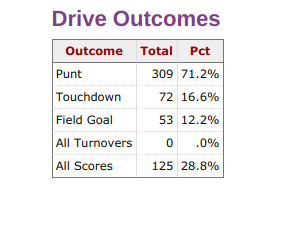
The numbers don't look so good in favor of momentum. And you may be thinking that this scenario is biased, as drives are more likely to stall when a team starts within their own 10. However, even if I gave the team the ball at the 50-yard line, the lowest punt percentage would still be 59.7% (drives started by defensive turnover). Calculating each PPD, punt drives equate to 1.49, turnover on downs drives are 1.15, and defensive turnover drives are 1.52. The difference between punts and defensive turnovers is only 0.03; punts also result in more points than turnovers on downs, even though they are immense defensive plays. We can now use this added context to reexamine the first set of percentages. The PPD of all defensive turnovers is much higher because it includes drives that start just inside/outside the red zone. Once again, we'd expect the drives which start with a turnover on downs/defensive turnovers to be much better.
3. The definition of momentum doesn't really make sense
Oxford defined momentum as "the positive or negative change in cognition, affect, physiology, and behavior caused by an event or series of events that affects either the perceptions of the competitors or, perhaps, the quality of performance and the outcome of the competition." This definition is implying that competitors begin to give up when something goes wrong. It is more likely that teams who give up a big play would try harder. The PPD study works to prove this idea. Additionally, momentum implies that once a team gains it, it will gradually increase. However, we see momentum shifts all the time, despite one team having decreased performance? Finally, it is hard to justify how a big play on one side of the ball affects the other side when there are 11 players on both sides.
The Dissenters - Well, What Sport Have You Played?
1. You can feel the momentum
Whenever I bring this argument up to others on the internet, I get the response, "Well, you haven't played any sports because you can feel the momentum." One, I have played soccer, and two, I can understand their point of view. I have played in games where my team explodes into life and completes an amazing comeback. I have also felt helpless as my side capitulates. In the same way, athletes talk about momentum all the time, or something to that sort. Often they will mention a lack of control of the game flow or an inability to chain plays together. Athletes have a more nuanced understanding of their sports than I do, so we shouldn't take these feelings lightly.
2. Some things just seemingly can't be explained
Like I previously mentioned, March Madness happened very recently. We saw Oral Roberts upset OSU and Florida, Abilene Christian beat Texas, and Northern Texas beat Purdue. The Browns won their first playoff game since 1994 in an unexpected fashion. We can look at statistics to explain some of these things, but within the moment, certain events seem near impossible. Even still, it is a lot more fun and interesting to explain these events with momentum.
Let's Get Hypothetical - Energy, Inertia, and Isaac Newton
- An object in motion will stay in motion unless acted upon by an outside force --> Teams will continue to generate momentum until their opposition does something (stalls a drive, gets a turnover, etc.) to stop them.
- An object at rest will stay at rest unless acted upon by an outside force --> Teams won't generate any momentum without making a big play and sustaining it over time.
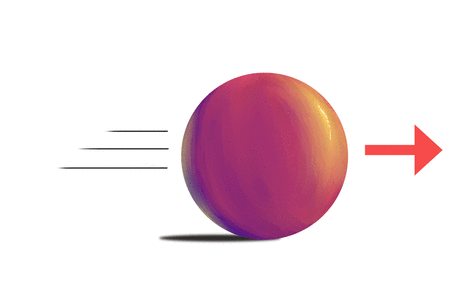
Final Thoughts - What You See Isn't Always What You Get
So this completes my official unofficial study of momentum within sports (really just football). But before I go, here are a few things to think about.
1. The Placebo Effect
I feel like a lot of the arguments for momentum are based on placebo. Whenever someone makes an argument for it, they always point out the instances in which it appears to happen. For example, let's say the Giants are playing the Eagles and are down in the fourth. The Eagles fumble, the Giants recover, the Giants score a touchdown and go on to win the game. People will look at that fumble as the turning point because it fits their argument. If the Giants immediately went three and out after the recovery, the entire conversation changes from one about momentum to a narrow Eagles escape.
2. Correlation does not equal causation
It would make sense that big plays cause teams to play better, but is that really true? Just because scoring drives or increased offensive/defensive play follows a turnover or big event, it doesn't mean that one caused the other. A defensive turnover realistically should have no impact on what the offense does when they get the ball. Things like DVOA, which measures offensive/defensive efficiency, by looking at the time remaining, score, down and distance, and the opponent's strength, would prove a better measure of how teams perform after big plays. (The drive finder doesn't measure DVOA, so I used PPD instead).
I hope you enjoyed my rant, I hope that my statistics weren't terrible, and I hope that we can engage in complex discourse on this topic. I'd love to hear if others have thought about this idea, and if so, what their stance is. Until the next one, thanks and take care.

As for drives following an opponent touchdown, we can set the "Drive Start" parameter to "Kickoff." I might drop a link with the stats when I get the chance. However, I don't think that we can look at previous drives, so I can't say how they'd do after throwing an interception.
My experiences with competitive sports is in cross country and track and field. I would definitely say that having the momentum in a sport like running definitely changes things. But, a sport like running is arguably a lot more mental than other sports like the ones that you mentioned.
Another example could maybe be tennis. I feel like if you're down by a lot, it can be really daunting that you have to "catch up" to your opponent's score. But I honestly have no idea, I've never played tennis competitively.
I guess what I'm mainly saying is in some sports, it's very easy for the lead of another team to get inside your head, meaning it's more of a psychological thing. Perhaps not so much with the sports you mentioned though, as you made a good case against it.
And awesome to meet another track athlete! What state are you from (if you’re from the US) if you don’t mind me asking. I don’t know of any states in the US that run the 400mH in high school. Usually it’s 300m.
I would think that a sports psychologist would probably refute my claim about athletes giving up. They exist for two reasons. To study what goes on in an athlete's brain while they're playing, and I think they also train athletes to control their emotions during games. A sports psychologist might say that what I'm claiming to be "excitement" is actually momentum. In the Oxford definition, they mention "cognition" and "perception." So they definitely believe that there's something going on in our heads.
Momentum in my opinion is hypothetical, and just one of those unwritten elements of sports.
I think Tennis would be the sport where that hypothetical concept exists the most, which is what @Cathlete said. This is because it is either a 1v1 or 2v2 sport, which is where the feeling of "I'm crushing this guy" really starts to kick in.
Now like both you and @cathlete said, tennis, and other solo sports are real game-changers. In football, you can lean on the 52 other players on the roster, in tennis you've only got yourself. If a tennis player says "Wow I'm in the gutter," that's probably going to affect their play, and I wouldn't be surprised if you could see that in the stats. That's because they are their only source of motivation AND play. When football players get down on themselves they know they can lean on their teammates.